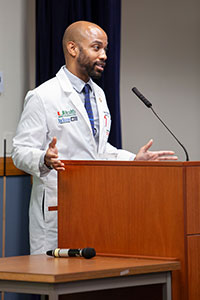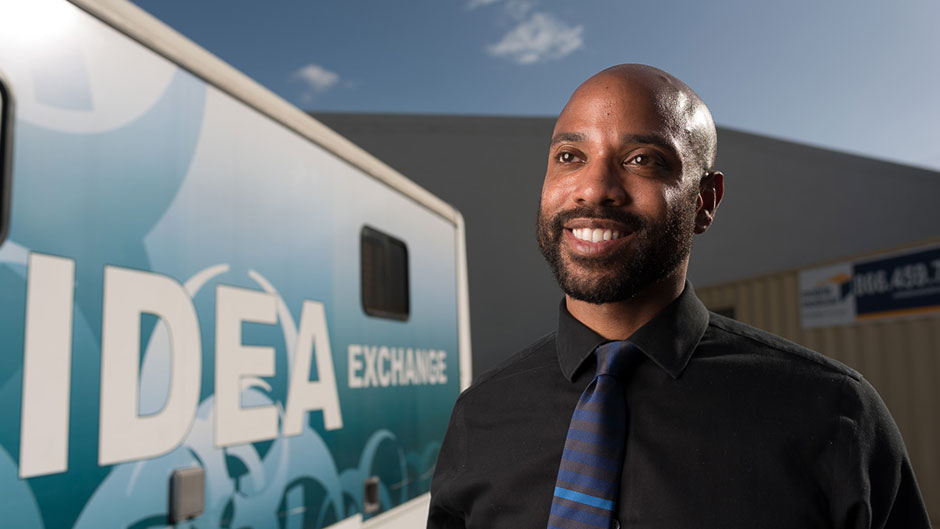In honor of their lifesaving work in reducing the spread of HIV, Hepatitis C, and other blood-borne diseases, the IDEA Syringe Services Program at the University of Miami Miller School of Medicine is being honored with a prestigious 2020 Sapphire Award.
The statewide award, presented by the Florida Blue Foundation, honors leadership and innovation by individuals, programs, and nonprofit organizations in improving hunger/food insecurity, opioids/substance abuse or poverty in Florida communities. Launched in 2016, UM’s IDEA Exchange provides individuals battling addiction with access to the tools necessary for them to be healthy and free of infectious diseases such as HIV and hepatitis C.

Since the Sapphire Award program began in 2005, the Foundation has presented 107 awards, totaling more than $5 million, to programs and organizations across Florida. This year’s winners were originally scheduled to be announced at the Sapphire Symposium in Orlando in May, but the on-going global pandemic forced the cancellation of the event. Winners were instead notified by Foundation representatives.
An independent panel of experts with state and national expertise in community health best practices helped select the honorees, who are awarded a total of $350,000.
The IDEA Exchange will receive $70,000 for its work as the first and only exchange program of its kind in Florida. Since its inception, IDEA has become a model for change statewide, as counties throughout Florida are now allowed to establish their own SSPs.
Besides its primary function of providing new syringes in exchange for used ones, the exchange hosts many auxiliary harm reduction services to reduce the spread of HIV, hepatitis C, and other blood-borne diseases and also links people to health care, medication-assisted treatment, behavioral health services, and other resources. IDEA's mission also includes educating the next generation of health care providers, researchers, public health officials, and social service providers on realities of substance use disorder and how to compassionately engage people toward improved health and well-being.
In honoring the IDEA Exchange, the Foundation noted that it offers clients “clear pathways to access the care they need to begin, and remain, on their journey to wellness, in an environment of partnership and respect.”
“We are very thankful for the Florida Blue Foundation’s recognition of our program and its investment in the community we serve,” said Hansel Tookes, M.D. ’14, M.P.H. 09, founder of the IDEA Exchange and assistant professor of clinical medicine in the Division of Infectious Diseases at the Miller School.
Since its inception, the IDEA exchange has had a substantial impact in reducing the number of opioid-related deaths in Miami-Dade County.

In the past four years, IDEA has enrolled 1,421 individuals, conducted 15,359 client exchange visits, in which over 524,141 used syringes were exchanged for new ones, performed 1,341 rapid HIV tests and 1,108 rapid Hepatitis C tests, distributed 3,443 boxes of Narcan and documented 1,807 overdose reversals, and made over 300 linkages to substance use treatment services.
New services in 2019-2020 include on-site linkage to HIV pre-exposure prophylaxis medication and on-site initiation of HIV treatment.
The IDEA Exchange is the result of years of tireless advocacy, care, and research by Dr. Tookes that began when he was a medical student advocating in the Legislature. His work paid off in 2016, when the state legislature allowed UM to establish a pilot needle exchange program by passing a law called the Florida Infectious Disease Elimination Act, or IDEA. Three years later, Florida legislators passed another bill, this time allowing counties across the state to establish similar needle exchange programs, like the one created by the Miller School, to reduce the spread of HIV and hepatitis C and prevent opioid overdose deaths.
For more information on the IDEA Exchange, visit https://ideaexchangeflorida.org/about/

